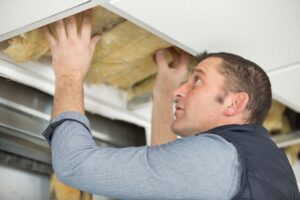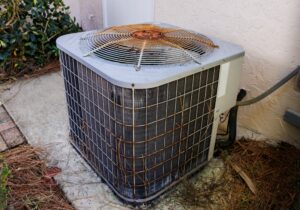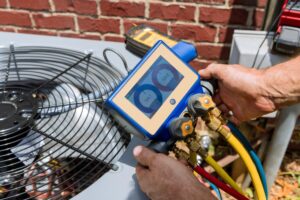When it comes to maintaining the health and efficiency of your HVAC system, regular maintenance is non-negotiable. Proper care ensures that your heating and cooling system runs smoothly for years to come, reducing unexpected breakdowns and expensive repairs. However, HVAC maintenance isn’t the only factor to consider. A critical element often overlooked is your home’s insulation, which can drastically hurt or improve the energy efficiency of your HVAC system. Keep reading for a closer look at insulation’s effects on HVAC efficiency.
Why It’s Important to Insulate Your Home
Insulation is a material used to reduce heat transfer between the inside and outside of your home. It keeps conditioned air inside during the winter and prevents heat from entering during the summer. This ability to control heat flow is crucial in ensuring your HVAC system doesn’t have to work harder than necessary to maintain desired temperatures.
Poor insulation can result in uneven temperatures, drafts, and higher utility bills due to the additional energy required to compensate for heat loss or gain. By investing in proper insulation materials, homeowners can experience a more consistent indoor climate and improved overall comfort.
But that’s not all. Proper insulation also helps to improve indoor air quality. By sealing gaps and preventing external contaminants from entering your home, insulation allows you to enjoy cleaner air and a healthier living space. This is particularly important for individuals with allergies or respiratory conditions.
How Insulation Affects HVAC Efficiency
When your home is poorly insulated, heat transfer occurs more rapidly, making it difficult for your HVAC system to maintain a steady temperature. As a result, your system cycles on and off more frequently, increasing energy consumption and accelerating wear and tear. Insulation plays a vital role in minimizing these issues by providing a barrier that slows down heat transfer and helps maintain consistent indoor temperatures.
When insulating your home to improve HVAC system efficiency, it’s important to consider the effectiveness of each type of insulation. For instance, high-quality fiberglass or foam insulation has superior thermal resistance, which means better performance in reducing heat flow. This, in turn, leads to lower utility bills and a reduced environmental footprint.
The Best Types of Insulation for Improving HVAC Efficiency
So, what are the best types of insulation for enhancing HVAC performance? Here are some insulation materials we recommend using to have a positive impact on your home’s energy efficiency:
Fiberglass Insulation
Made from fine glass fibers, fiberglass insulation is available in batts, rolls, and loose-fill forms. It is highly effective at reducing heat transfer, making it an excellent choice for insulating attics, walls, and floors.
Spray Foam Insulation
Spray foam insulation is known for its superior air-sealing properties. It expands upon application, filling gaps and creating an airtight barrier that minimizes heat transfer and prevents conditioned air from escaping. Spray foam is particularly effective in hard-to-reach areas, such as around ductwork, pipes, and electrical outlets. Its high R-value (a measure of thermal resistance) makes it one of the best materials for improving HVAC efficiency.
Cellulose Insulation
Made from recycled paper products, cellulose insulation is an environmentally friendly option that provides excellent thermal performance. It is often used in attics and wall cavities, where it can be blown in to fill spaces completely. Cellulose insulation has a high R-value and is effective at reducing air leaks, making it a cost-effective way to enhance your HVAC system’s performance.
Rigid Foam Insulation
Rigid foam insulation panels are used to insulate walls, roofs, and foundations. These panels have a high R-value per inch, providing excellent thermal resistance. Rigid foam is durable and moisture-resistant, making it suitable for areas prone to dampness, such as basements and crawl spaces.
The Most Important Areas to Insulate for HVAC Efficiency
To maximize the benefits of insulation, particular areas of your home should be prioritized. Focus on insulating these parts of your home first:
- Attic: Heat rises, and without proper insulation in your attic, warm air can easily escape, forcing your HVAC system to work harder to keep your home comfortable in the winter. Insulating your attic can significantly reduce energy loss and improve your system’s efficiency.
- Walls: Exterior walls are another major source of heat transfer. Proper wall insulation can help maintain a stable indoor temperature, reducing the load on your HVAC system.
- Floors and Crawl Spaces: Insulating floors, particularly those above unheated spaces like crawl spaces and basements, can prevent cold air from seeping into your living areas and reduce the need for excessive heating.
- Ductwork: Insulating your HVAC ductwork ensures that conditioned air is delivered efficiently throughout your home. Poor insulation in ducts can lead to energy loss and reduced system performance.
Combine Proper Insulation With HVAC Maintenance
Understanding how insulation affects HVAC efficiency is just one step toward maintaining a comfortable and energy-efficient home. Regular maintenance is also crucial to keep your system running smoothly and efficiently. At H.J. Faust, we offer professional AC maintenance in Burlington, WI, and the surrounding areas to help ensure your system is in top condition. By combining proper insulation with regular HVAC maintenance, you can enhance your system’s performance, reduce energy costs, and extend the equipment’s lifespan.
Contact H.J. Faust, Inc. today to schedule an AC, heating, or mini-split maintenance service and start reaping the benefits of an energy-efficient home.



